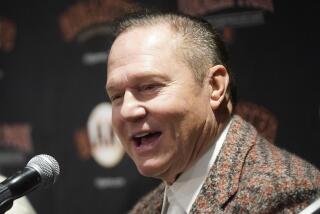Not Worth Paper It’s Written On
- Share via
If taxation without representation is tyranny--as famed union leader James Otis first noted during the 1763-64 season--what, then, is no taxation without unrestricted free agency before the age of 32?
“Our best offer,” was what NHL Commissioner Gary Bettman called it Saturday night in New York, having dispatched the owners’ latest counter-counter-counter-prososal to the players with love, kisses, best wishes and a drop-dead deadline of noon Tuesday (EST).
In case you were wondering, this is what happens when you lock a bunch of hockey owners in a room for more than seven hours, with breaks only for water and--if the eyewitness accounts are accurate--ringside cut men.
With the let’s-play-at-any-cost doves in one corner, the shut-it-down-tomorrow hawks in the other and the players’ “final offer” on the table, the meeting commenced and a hockey game broke out.
ESPN reported that the session was “heated at times,” prompting periodic outbursts of “shouting” and “screaming.”
Bettman, who officiated, described it as “a free, open, candid discussion . . . sometimes emotional . . . long and exhausting.” The combatants, he said, “were vocal and passionate.”
And when they emerged, gloves off, neckties loosened, the judges’ scorecard had it 19-7 in favor of rejecting the players’ offer and 20-6 in favor of sending union chief Bob Goodenow the following “compromise:”
--No luxury tax, nuisance tax, contribution plan or salary cap by any other name. Strike up the headlines: Owners Make One Concession!”
--Unrestricted free agency at age 32, instead of 28, which the union originally demanded, or 30, which was included in the the union’s last proposal.
--A salary cap on first-round draft choices, beginning at $825,000 the first year of the agreement, or about one-third the yearly salary Paul Kariya signed for.
--Up to twice a year, teams can “walk away” from salary arbitration awards of at least $500,000. The union originally opposed all non-binding arbitration, then consented to one walkaway per year after an award of at least $701,000.
--The basic agreement will cover this season and the next five, but the owners gave themselves the right to reopen negotiations after the 1997-98 season, meaning that the start of the 1998-99 season will very likely be postponed until mid-January, 1999.
(P.S. Dear Bob: If you choose not to accept these terms before noon Tuesday, the 1994-95 season will be canceled and it will be on your head. Sleep well.)
Bettman then lined up several owners for a choral presentation of “I’ve Got The Small-Market Blues.” Go ahead, Headmaster Bettman nudged his pupils, tell them what you really think of our magnanimous act of astounding generosity.
“You can be honest, too,” Bettman instructed them.
Woe is New Jersey’s John McMullen: “I’m not happy with the deal . . . I think this is a real compromise on the part of the owners.”
Poor, poor George Gund of San Jose: “I’m not sure if I can live with it or not. We certainly can’t live with anything less.”
Quebec’s Marcel Aubut announced that he’d voted against the proposal because “a deal without a tax or cap would not be acceptable in a market like mine. I think we would survive better if we don’t play.”
Survival through non-existence--what a concept. From the same people who brought you, “Ice Hockey: The Sport Of The ‘90s . . . Except For The Last Three Months Of ’94 And Probably The First Nine Months of ’95.”
Early reaction from the players has been many thumbs down, and it’s hard to blame them.
Unrestricted free agency at 32?
Why not make it 42?
Or 62?
At 38, the Kings’ Barry Melrose would barely qualify under the league’s suggested policy. So would the Ducks’ Ron Wilson, who is 39.
Unfortunately, Melrose and Wilson retired years ago and are now NHL head coaches.
But, hey, free agency at 32 would cut loose the shackles of the Ducks’ . . . well, let’s take a look here . . . no, not Tom Kurvers; he’s been around forever but he’s only 30 . . . no, not nine-year veteran Todd Ewen; he turns 29 in March . . . there must be someone . . . oh, yes, Randy Ladouceur, who turned 32 last June and could be retired by next June . . . and . . . OK, there’s also Anatoli Semenov, who turns 33 in March. Including his years with Moscow Dynamo, Semenov has spent 15 seasons playing major league hockey. He peaked in ‘86-87.
Two Ducks. That’s it. Five Kings would qualify, but two--Pat Conacher and Charlie Huddy, both 35--are third-unit grinders, dime-a-dozen in this league. Wayne Gretzky is 33, but locked up with a long-term contract, Jari Kurri (34) might help someone for a couple years, maximum, and Kelly Hrudey (33) could latch on as somebody’s backup goalie.
On average, hockey careers are the shortest in any of the four major sports. At 32, most NHL players are seriously contemplating new positions in broadcasting or on IHL coaching staffs. (For the record, Melrose retired at 32, Wilson at 33.)
Conacher, among the few eligible to test the system were it implemented, said Saturday night that “there’s no way” he would vote for such a contract and predicted the union’s rejection of the offer “without a doubt.”
The players also aren’t keen on the owners’ walkaway arbitration plan, but that’s where this thing is headed now. Twenty-six owners and 600-plus players, set to do just that come Tuesday at 12:01 p.m.
Walk away.
More to Read
Go beyond the scoreboard
Get the latest on L.A.'s teams in the daily Sports Report newsletter.
You may occasionally receive promotional content from the Los Angeles Times.






